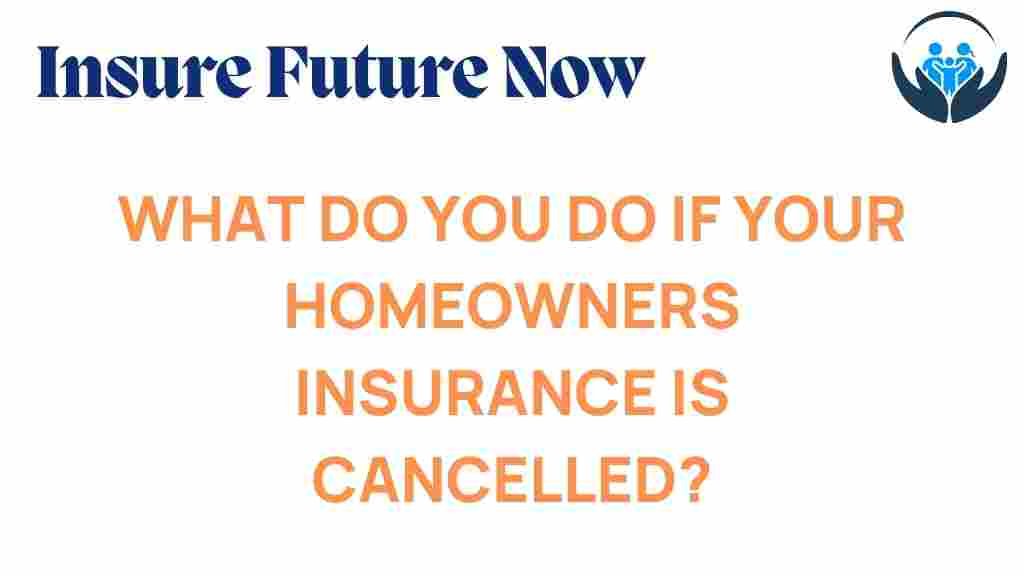What to Do When Your Homeowners Insurance Is Canceled
Experiencing a cancellation of your homeowners insurance can be a stressful and daunting situation. Homeowners insurance is vital for protecting your property and financial safety. If you find yourself in this predicament, it’s essential to understand your options and take proactive steps to secure new coverage. This survival guide will provide you with practical tips, insights into coverage options, and strategies for navigating the cancellation of your homeowners insurance.
Understanding Homeowners Insurance Cancellation
Before diving into the steps to take after a cancellation, it’s crucial to understand why homeowners insurance policies are canceled. Insurance providers may cancel your policy for various reasons, including:
- Failure to pay premiums
- Significant changes in risk factors (e.g., home condition, location)
- Frequent claims or high-risk activities
- Insurance fraud or misrepresentation
Understanding the reason behind your cancellation is the first step in addressing the issue and securing new coverage.
Step-by-Step Process After Cancellation
Once you receive a cancellation notice, follow these steps to manage the situation effectively:
1. Review the Cancellation Notice
Carefully read the cancellation notice from your insurance provider. It should outline the reason for the cancellation, the effective date, and any actions you can take to prevent it. If there are any discrepancies or you believe the cancellation is unjustified, contact your provider immediately for clarification.
2. Assess Your Coverage Options
After understanding the reasons for the cancellation, explore alternative coverage options. Consider the following:
- High-Risk Homeowners Insurance: If your home is in a high-risk area or has unique features, specialized insurers may offer coverage tailored to your needs.
- State-Sponsored Programs: Some states offer insurance programs for homeowners who struggle to find coverage in the private market.
- Non-Standard Market: Look into non-standard insurance providers that specialize in high-risk policies.
3. Shop Around for New Insurance Providers
Don’t settle for the first offer you receive. Take the time to shop around and compare quotes from multiple insurance providers. When doing so, consider:
- Coverage limits
- Deductibles
- Exclusions
- Customer reviews and ratings
Utilize online tools and resources to compare policies effectively. Websites such as Insurance.com can help you gather quotes from various providers.
4. Consider Policy Alternatives
If traditional homeowners insurance policies are not available to you, consider these policy alternatives:
- Dwelling Fire Insurance: This type of insurance typically covers the structure of your home and may be easier to obtain.
- Landlord Insurance: If you rent out your property, landlord insurance can provide coverage for rental properties.
- Umbrella Insurance: This can provide additional liability coverage over your existing policies.
5. Improve Your Home’s Risk Profile
Making improvements to your home can lower your risk profile, making it more appealing to insurance providers. Consider the following enhancements:
- Updating electrical wiring and plumbing
- Installing a security system
- Adding smoke detectors and fire extinguishers
- Maintaining your property to prevent hazards (e.g., removing dead trees, fixing leaks)
6. Document Your Property
Before applying for new coverage, document your property thoroughly. Take photos and keep records of valuable items and any improvements made. This information can be beneficial when applying for new policies and may help you secure better rates.
Troubleshooting Tips for Homeowners Facing Cancellation
If you face challenges finding new homeowners insurance after a cancellation, consider the following troubleshooting tips:
1. Communicate with Your Current Provider
Sometimes, cancellations can be reversed, especially if you rectify the issue that prompted the cancellation. Discuss your situation with your current insurance provider and see if they can offer a solution.
2. Consult an Insurance Broker
An experienced insurance broker can provide valuable insights and help you navigate the complexities of finding new coverage. Brokers have access to multiple insurance providers and can assist you in finding the best fit for your needs.
3. Focus on Risk Management
Implementing effective risk management strategies can improve your chances of securing coverage. This includes:
- Regular property maintenance
- Creating a disaster preparedness plan
- Reducing potential hazards (e.g., keeping walkways clear, using non-flammable materials)
4. Stay Informed About Insurance Regulations
Insurance regulations vary by state. Stay informed about your state’s laws regarding homeowners insurance and any protections you may have, especially in cases of cancellation.
Homeowner Tips for Maintaining Coverage
To avoid future cancellations and ensure continuous homeowners insurance coverage, consider the following tips:
- Pay your premiums on time: Set up automatic payments to avoid lapses in coverage.
- Keep your information updated: Inform your insurance provider of any changes to your property or circumstances.
- Limit claims: Be mindful of how many claims you file, as frequent claims can lead to increased premiums or cancellations.
- Review your policy regularly: Annually review your homeowners insurance policy to ensure it meets your current needs.
Conclusion
Facing a cancellation of your homeowners insurance can be overwhelming, but it’s crucial to remain calm and proactive. By understanding the reasons for the cancellation, exploring coverage options, and implementing risk management strategies, you can secure new insurance and protect your financial safety. Remember to communicate effectively with insurance providers, document your property, and seek help from professionals when needed. With these tips, you can navigate this challenging situation and ensure your home remains protected.
For additional resources on homeowners insurance and coverage options, visit NAIC.org, a valuable site for homeowners seeking guidance on insurance matters.
This article is in the category Tips and created by InsureFutureNow Team
